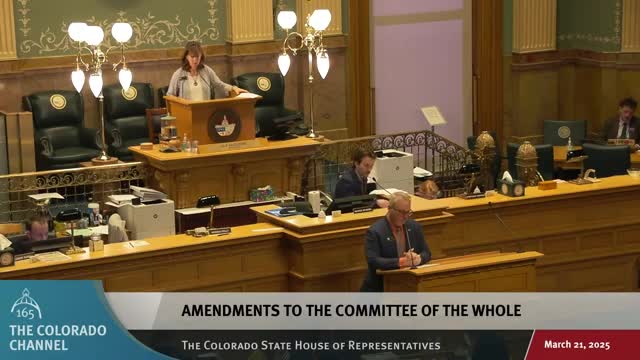Colorado House rejects multiple amendments to Senate Bill 3; Committee of the Whole report adopted
Get AI-powered insights, summaries, and transcripts
Subscribe
Summary
On March 21 the Colorado House debated several amendments to Senate Bill 3 and rejected a series of proposals aimed at changing penalties, implementation language and fiscal assumptions. After roll-call votes the Committee of the Whole report on SB 3 was adopted 38-27.
The Colorado House spent extended debate on amendments to Senate Bill 3 on March 21, rejecting multiple amendment motions and ultimately adopting the Committee of the Whole report by a roll-call vote of 38-27.
The package of votes began with the Bottoms amendment, which Representative Bottoms moved as a fiscal “safety net” intended to protect federal funding. Representative Bottoms said, “this is just an attempt to keep, our federal money from being taken away” and argued the amendment would secure a letter ensuring the state’s $27,000,000 in federal funding for Colorado Parks and Wildlife. The Bottoms amendment failed, with the clerk announcing, “With 28 I, 36 no, and 1 excused, the amendment is lost.”
Members then considered a Brooks amendment that the sponsor described as a limited security-net measure that “does not change the policy.” After debate, the Brooks amendment was rejected, recorded as 22 yes to 43 no.
Representative Caldwell offered an amendment to reduce certain penalties from a class 2 misdemeanor to a petty offense, saying the change reflected concern that “accidents happen or mistakes” under a new law. The House rejected the Caldwell amendment, 23 yes to 42 no.
Representative DeGraaf moved an amendment to change a number of mandatory implementation provisions from “shall” to “may,” arguing the current draft mixed “optional and necessary” language. Supporters of making the language mandatory said agencies should be required to build the systems the bill contemplates. The DeGraaf amendment was defeated, 24 yes to 41 no.
Representative Gonzalez brought forward language intended to address access for people with disabilities in the registration and training processes; that amendment also failed, 26 yes to 39 no.
Representative Luck (first and second Luck amendments) pressed fiscal concerns, arguing the fiscal note understates the program’s cost and staffing needs. Luck and several supporters cited Colorado Bureau of Investigation (CBI) InstaCheck statistics and contended the number of likely applicants could be far higher than the fiscal note’s assumption of 50,000. The House rejected both Luck amendments (first Luck: 26 yes to 39 no; second Luck: 24 yes to 41 no). A third Luck amendment was moved and debated (including discussion of a 90% exam score standard and substitution of an alternate performance metric), but the transcript does not record a final tally for that specific motion.
Other amendments moved during the floor session (including motions by Richardson/Winter and Succla) were debated; several failed on recorded votes. After consideration of the amendments, the House voted to adopt the Committee of the Whole report on SB 3. The clerk announced, “With 38 I, 27 no, and 0 excuse, the report of the Committee of the Whole is adopted.”
On several occasions members raised fiscal and implementation questions: critics said the fiscal note underestimates costs such as building a certification exam, integrating data across instructors, sheriffs and federal firearms licensees, and staffing a new records-and-verification system. Representative Tigert said the fiscal note is “incomplete” and listed items not addressed there, while a sponsor and leadership defended the agency-based fiscal assumptions and urged members to rely on the fiscal note provided to the committee.
Several members framed votes as matters of constitutional protection or personal liberty. Assistant Minority Leader Winter and others urged members to give constituents a recorded vote to show where they stand on changes the bill would impose.
The House concluded the session by laying over the balance of the calendar until Monday, March 24, 2025, at 10 a.m., and adjourning until that time.
Votes at a glance - Bottoms amendment — motion to adopt security provision to protect federal funding; outcome: lost, 28 yes, 36 no, 1 excused. - Brooks amendment — motion to add a security net clause; outcome: lost, 22 yes, 43 no. - Caldwell amendment — reduce penalty class (class 2 misdemeanor to petty offense); outcome: lost, 23 yes, 42 no. - DeGraaf amendment — change “shall” to “may” for implementation duties; outcome: lost, 24 yes, 41 no. - Gonzalez amendment — accommodations and registration provisions for people with disabilities; outcome: lost, 26 yes, 39 no. - Luck (first) amendment — fiscal/FTE adjustments based on CBI InstaCheck comparisons; outcome: lost, 26 yes, 39 no. - Luck (second) amendment — continuous appropriation concerns; outcome: lost, 24 yes, 41 no. - Third Luck amendment — debated (exam score/standard substitution); recorded vote not specified in the transcript. - Committee of the Whole report on SB 3 — adopted, 38 yes, 27 no.
Members repeatedly debated administrative details — how agencies would create and score a certification exam, how many full‑time employees would be needed (sponsors’ fiscal note: 3 FTE; critics proposed up to 24 FTE in a scaled estimate), and whether federal funding (cited figure: $27,000,000 for Colorado Parks and Wildlife) would be at risk. These procedural and fiscal concerns were central to floor debate and to members’ recorded votes.
(Quotes are drawn verbatim from remarks on the floor and are attributed to the members who spoke.)
